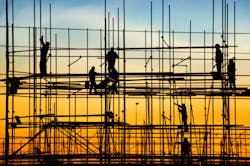It is election season this week, as off-year elections are taking place around the country this week. As I watch the live coverage and the updates streaming in from close races in New Jersey, Virginia, and other US states, I consider the fate of the bipartisan infrastructure bill. Its progress to this point must be weighed alongside the potential ramifications of this week’s results at the polls. According to Jonathan Martin of The New York Times, if Terry McAuliffe (the Democratic candidate for the Virginia governorship) loses, "or barely win[s] what most polls show is a neck-and-neck contest, moderates will demand immediate passage of the infrastructure bill." The stakes in Washington are certainly high, and—with only a sliver of a Democratic majority in the Senate—both parties are expected to consider the Virginia results to be a political barometer before next year’s midterm elections.
This rendering makes sense: while state governors are not Washington representatives, Virginia is a “purple state” that might be considered a microcosm for much of the country. Given the state population’s stratified nature—from the DC metro area, to Richmond suburbs, and the vast rural regions beyond—all of this political moment’s anxieties proliferate on both sides of the political spectrum. Martin notes that, "while Democratic lawmakers have dwelled almost exclusively on the infrastructure bill and their broader social welfare and climate proposal—matters on which they have not reached consensus—Americans outside of Washington have grown impatient with the lingering virus and the soaring prices of goods." Only a few months ago, the bill’s urgency seemed to be a given. This week’s elections, though, might offer clues to its legislative viability, indicating to observers the bill’s potential fate.
This political uncertainty comes amid pivotal industry figures’ coordinated push to accelerate the bill’s progression. The Associated General Contractors of America (AGC) released an analysis of federal construction spending data this week. AGC officials are urging Representatives in the House to push forward on the bipartisan infrastructure bill that was passed by the Senate this year. The AGC asserts that when legislators drag their heels, the nation suffers the consequences, as “each day’s delay is putting the nation further behind in unclogging supply chains and enhancing competitiveness.”
Some evidence suggests such urgency is not simply political rhetoric. From January to September, infrastructure spending dropped in most categories compared with 2020; highway and street construction spending was 1.3% lower, public transportation dropped 6.8%, and conservation and development construction was 19.5% lower than last year. The only public infrastructure segment to see an increase was sewage and waste disposal structure investment, which rose 4.3%. Given President Biden’s long standing focus on revitalizing America’s infrastructure, his own fate may rest with his Congressional colleagues’ willingness to move the bill over the line.
GX’s chief editor, Arturo Santiago, discussed the infrastructure bill in his Editor’s Blog last month, saying, “I don’t think anyone knows if or when we’ll ever get there.” The bill, if—or when—it is passed, could create 100,000 jobs before President Biden’s first term comes to an end. It also aims to improve water, energy, and communications infrastructure in addition to providing benefits to roads, bridges, and other critical infrastructure. I hope we can get there soon.
